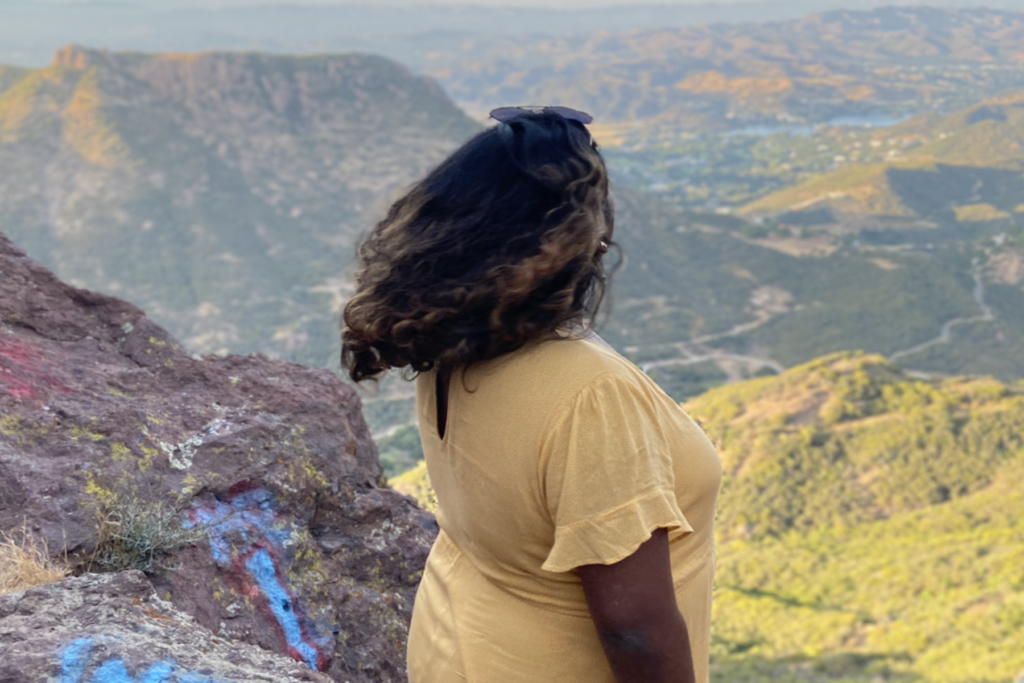
Photo courtesy of Nisha Srinivasa
When I walk into a room with my head of ringlet curly hair, I tend to confuse a lot of people.
Can I ask you, I mean, if you wouldn’t mind sharing, what’s your ethnicity?
My favorite part about that question is how the word ethnicity is always said as if it’s a dirty thing, with a preceding dramatic pause.
“I’m Indian!” I always reply, with an all too chipper smile that disguises my inner Lizzie’s McGuire’s “Damn if I had a dime for every time I answered this exact goddamn question” sigh of exasperation. If you didn’t get that reference, I’m sorry.
But your hair? And you, well, Indian girls just always look different to me is all.
Aaaaand there it is.
[Read Related: Fat-Shaming and the South Asian Community]
Sure, my head of curls isn’t all too common “for my race”… I suppose. But usually, that’s not what people who make that comment are talking about because whenever anyone’s said that to me, I also get the body scan.
You know, the one where people take an uncomfortably long, yet all too short amount of time to look at you up and down — definitely with some repetition while pretending that wasn’t a thing that just happened as their mind is trying to process the fact the body they’re examining doesn’t fit any of the molds created by predetermined racial archetypes. It’s chill.
And I mean I get it — when one of the only famous Indian people you’re exposed to in the West is Priyanka Chopra, a goddess who could destroy anyone with her on-point top liner filled gaze, it’s culturally jarring to see someone of the same ethnicity who doesn’t match up to that expectation, I suppose.
But we! are! out! here! And I know for a fact there’s a lot of things we have to say before we reach a state of accepted “normalcy”— especially when it comes to size.
Just to clear the air, the biggest thing I have to mention here is YES! HELLO! I HAVE THIGHS! Really. big. thighs. And if I don’t put Body Glide on them in the morning, it’s doomsday.
Don’t get me wrong — I’m now pretty body positive. But it hasn’t always been that way. My experience with my body has had a pretty complicated evolution.
[Read Related: On Hair and Self-Love: Embracing My Curls]
Body politics never fail to plant its roots in daily conversations. The Indian woman, to the Western eye, is supposed to be ‘exotic’— whatever the hell that means. Her body is to be “pleasing” to the eyes that serve as its spectators. Shoutout to Eurocentrism and centuries of British patrimony for those toxic thoughts.
It’s crazy the way all of those perspectives have been culturally internalized too—because damn, did they rear their ugly heads in my family life, especially throughout my childhood.
Everyone who knows me knows I have a basket case of health issues. But somehow, my family would magically always relate them to my weight, as if me losing a couple of pounds would magically cure my autoimmune issues that have pretty much nothing to do with that.
The first fatphobic comment I heard was said to me when I was 6, and one of the most jarring of all was when I was 9.
You really have to focus on losing that weight. No one wants to have that much on their body. Your health matters.
Pretty harsh for a 9-year-old to hear, but of course, my mediating, docile self swallowed it like the spoonful of sugar that makes the medicine go down.
Years have passed since my initial experiences with fatphobia and ensuing racial identity crises, and even though they’ve given me specific images of how others view my place in the world, those images are not ones that I’m continuing to accept. Here I come, a woman rebuilt, informed and constantly wearing a floral dress about to entirely disrupt all of these narratives of who I am and who I should be!
I am so curvy — and I like myself! Sure, I go through cycles of healthy and unhealthy thoughts, and I acknowledge when my mind tends to take me a little further south of where I want to be in terms of positive thought.
[Read Related: Self-Love is for Everyone]
But if I can’t work to acknowledge my full self, I’m not the only person I disservice. All other women in my position, particularly POC women who’ve been exposed to toxic conversations about their bodies, skin and appearances and how they are supposed to exist within their respective cultural frameworks, are at stake as well. I don’t mean to say that I’m some role model or hallmark of thought whom other people depend on or anything. I mean to say that if I can’t critically examine myself and my own internalized feelings about my body as it relates to my culture, my family, and the world, I wouldn’t be able to do the same for people in other communities.
So long story short — it’s always a work in progress. But-
My name is Nisha. I am an Indian American woman, I’m 5’3, I have a head of hair so thick and curly it feels like a blanket, and my thighs are the size of two tree trunks.
But I’m also Nisha, someone so goofy that people barely believe her stories are actually real. Someone who cares a lot about people and the way they exist in the world to the point where she feels physical pain when someone she loves is hurting. Someone who cries until they laugh and who also laughs until they cry. Someone who likes to make everyone around her smile.
That’s the person you get whenever I walk into a room. So enjoy!




